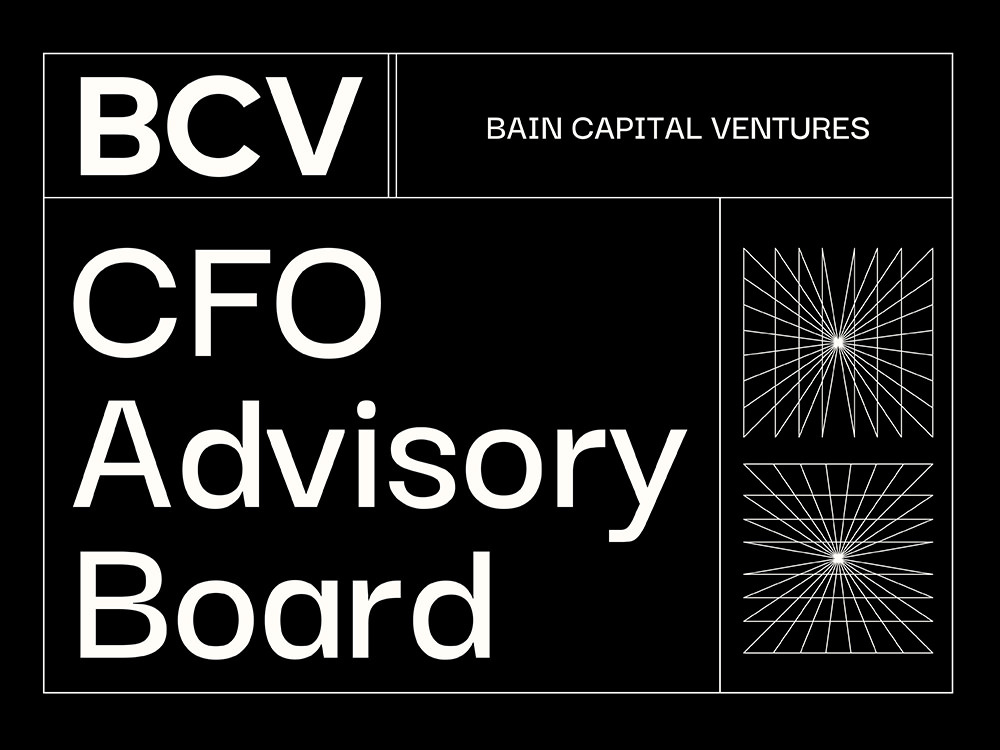
Introducing the BCV CFO Advisory Board
The CFO leaders are part of a community that will benefit each member and the Bain Capital network.

Amanda is focused on early-stage infrastructure investing in our San Francisco office.
When I ask founders how they know Amanda, their stories never line up. One might say, “Oh, Amanda is helping us make our first DevRel hire!” Another might say, “Amanda! She’s doing customer discovery with us right now.” A third might go, “Amanda is great! She’s hosting a meetup for our users tonight.” I’m forced to conclude that “Amanda” is really 10 people in a trench coat, each with a different superpower in helping founders succeed.
But maybe I should be less surprised, knowing Amanda’s background — her incredible range as an investor is predictable from her multifaceted experience prior to joining BCV. In college, Amanda majored in CS and worked as a backend developer… but also earned a second major in Econ and led one of central California’s largest econometrics research projects. At Adobe, Amanda was a developer advocate for Creative Cloud, Express, and Firefly (Adobe’s AI image gen product)… but also served as a PM and an engineering manager on different projects. Here at BCV, Amanda has already shown her expertise within infra software… but I’m constantly learning new things from her across economic history, art, and journalism.
We’re thrilled to have Amanda on the team, and can’t wait for you to meet her too. You can learn a little more about Amanda, in her own words, below!
Before I started college, I thought I’d become a journalist or a professor. I grew up reading a lot of history and non-fiction, and became interested in journalism as a vehicle to learn more about the stories of those around me. When I went to university, I thought I’d study something that would allow me to continue to research and write about global issues — maybe international relations or economics.
I starting taking some computer science classes because I was interested in practical applications of the theory we were learning in my economics courses. On campus, I led a research group that produced economic forecast reports for local municipalities each year. Our data aggregation techniques at the time were painfully manual. My team and I automated the repetitive work which gave us more time to work on white papers with professors. For a while, I thought maybe I’d work for the Federal Reserve.
The problem is that institutions like the Fed often don’t receive a budget or mandate to adopt cutting-edge technology. I fell in love with how creative you can get with code, and became really interested in the intersection of art and computing and I wanted to work somewhere more technology-forward. Computer graphics and computer systems were some of my favorite courses. I interned at Microsoft, where I worked on Azure natural language processing, then at Rapid7, a BCV portfolio company, where I built a web application firewall product. Wanting to learn more about the ins-and-outs of web application security, I worked on a product security team at Relativity the following summer, improving the performance of our log ingestion tool and building a full-stack app that would give internal teams more visibility into Relativity environments.
After graduation, I joined Adobe as a developer advocate, focused on enabling third-party developers to extend flagship applications like Photoshop with plugins and scripts. During my time there, we launched a product called Adobe Express and started building a web extensibility ecosystem. I managed the end-to-end developer journey for Adobe Express Embed SDK and helped companies like Microsoft, Wix and Kajabi embed editing capabilities within their own platforms. My team shipped the first set of enterprise APIs for Adobe Firefly, a family of generative models, and delivered a robust developer experience for teams with creative automation needs. If something was obviously not working well operationally, startups are quicker and more willing to invest in finding a better approach.
What I learned from all of these experiences is that most bigger organizations aren’t able to fund really cutting edge work, if it falls outside of core product. Venture is incredibly appealing from that lens. The investments we make can lead to large scale changes in legacy industries, and create entirely new ones.
I’m a backend engineer, and program a lot in Python, C++, and Java. At Adobe, we produced a lot of JS APIs and leveraged WASM to bring computationally heavier operations into the browser. It’s really useful to be able to try tools out firsthand, and put myself in the shoes of the customer for so many of the companies we back.
I’ll be focused on developer tools and AI infrastructure. Slater [Stich], who I will work with the most, is an incredible data mind and I’ll also be supporting him in identifying stellar lower-level data infrastructure companies.
As an engineer myself, I’m excited to fund tools that make the working engineer’s life easier. My dad worked in academia his entire life, and I love finding important discoveries from that world and commercializing them for maximum reach and impact.
I’m interested in talking to people who have thought deeply about problems in areas where they have deep domain expertise, either through academia or work. It doesn’t have to be a company yet. I love meeting folks who understand the bottoms-up, community-driven adoption motion and am a huge fan of open-source.
With founders, I operate with empathy and am looking to understand the “why us” and “why now.” I’m eager to support founders as a thought partner — feel free to reach out if you’re interested in chatting about product or developer experience.
The CFO leaders are part of a community that will benefit each member and the Bain Capital network.
We are launching the new BCV today, at the dawn of the AI revolution.
You’ve got a lot of hats. Here’s how to wear them well. As an early-stage founder, you’re doing it all. Recruiting a team, raising money, managing product, establishing a brand and culture, and telling the world why it should pay attention. Thankfully, our Investor and Platform team leaders have lived through it on both the…